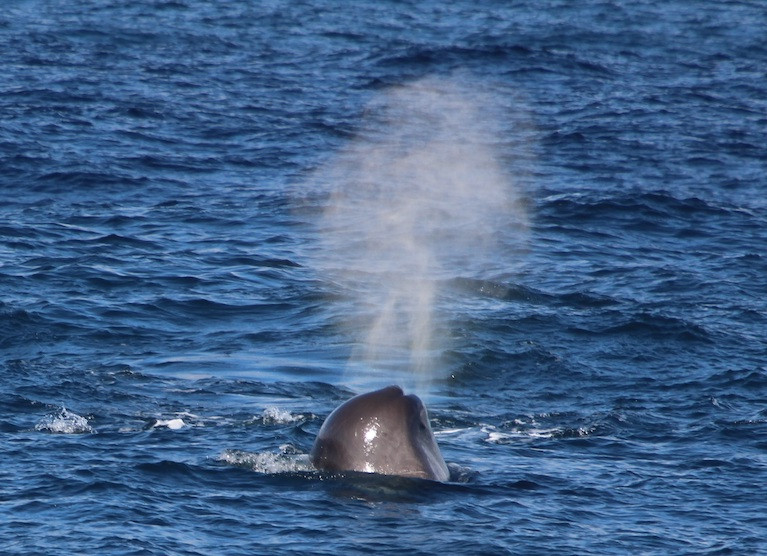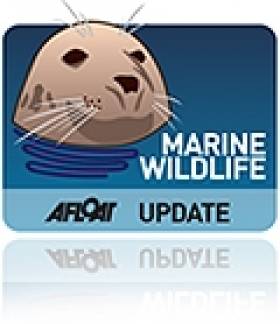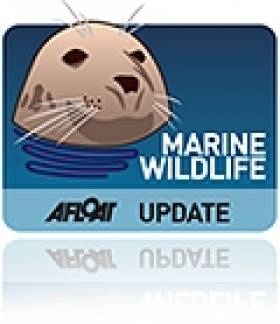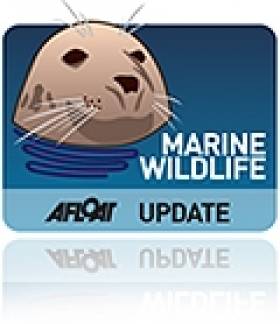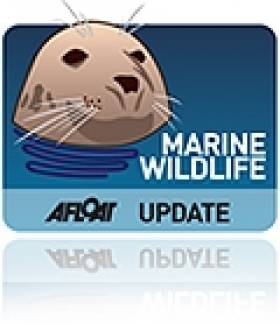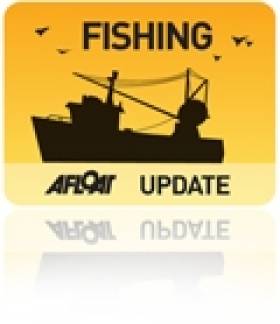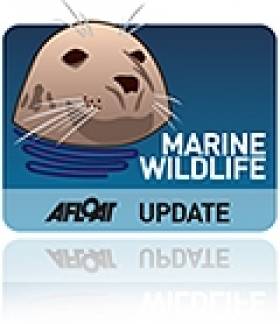Displaying items by tag: sperm whale
High Numbers of Sperm Whales Counted off Irish West Coast in New Study
Up to 380 sperm whales are living in deep waters off the Irish coast, a newly published study has found.
This makes sperm whales “one of the most abundant great whale species” in these waters, expert Dr Simon Berrow says.
Sperm whales are known for their distinctive echolocation “clicks” which can be heard over many tens of kilometres, and this allows them to be counted.
A survey team from Galway-Mayo Institute of Technology (GMIT) and the Scottish Sea Mammal Research Unit (SMRU) Consulting spent 45 days at sea in harsh weather conditions to conduct the population count.
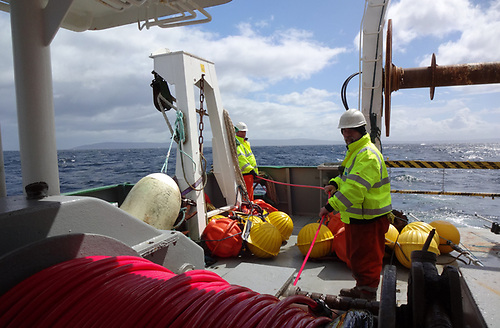 Deploying towed hydrophone from RV Celtic Voyager Photo: Simon Berrow
Deploying towed hydrophone from RV Celtic Voyager Photo: Simon Berrow
“With high sea states and towering swell, the study relied purely on being able to detect the distinctive powerful click trains of sperm whales using a streamlined towed hydrophone or underwater microphone array,” Dr Berrow said.
The results were published recently in the Journal of Cetacean Research and Management, following detailed sea surveys dating back to 2015.
Dr Berrow, the principal investigator on the study, noted that the deep-diving tendency of sperm whales makes them difficult to observe at sea – they can spend nearly an hour in depths below 300m.
Only 11 individuals were sighted during 388 hours of effort, he said, but 391 acoustic detections were recorded.
 Sperm whales off Ireland’s west coast Photo: Irish Maritime Squadron
Sperm whales off Ireland’s west coast Photo: Irish Maritime Squadron
“Each whale was pinpointed by comparing the exact time that each click arrived at each hydrophone in the array and then triangulating bearings from sequential clicks over extended encounters,” he said.
The whales seemed to prefer seabed areas that sloped to the northwest, including the Erris and Rockall Basins.
There was also a dense concentration of sperm whales in the South Brona Basin canyon system near 350km west of Co Kerry
The surveys were carried out from the Marine Institute’s RV Celtic Voyager and the yacht Song of the Whale, operated by Marine Conservation Research Ltd.
The study was part of the ObSERVE-Acoustic project funded by the Department of Communications, Climate Action and the Environment and the National Parks and Wildlife Service.
More here
Whale Carcass Causes A Stink On Donegal Beach
#MarineWildlife - Locals near Magheraroarty Beach in Co Donegal were left with a smelly situation last week after the remains of a whale buried on the strand were washed back onto the surface in a matter of days.
According to The Irish Times, the sperm whale carcass was first found beached on Friday 19 June and buried under the sand where it was found by Donegal County Council over that weekend.
However, on Monday 22 June the cetacean carcass reappeared after it was washed back out from its burial place with the tide.
And in its more advanced decomposing state, the noxious odour was beginning to cause a stink among regular beach users and locals alike. The Irish Times has more on the story HERE.
Dead Whale Explodes, Marine Biologist Escapes Flying Entrails
#whale – A marine biologist who attempted to cut open a dead Sperm Whale beached in the Faeroe islands last Tuesday (November 26) narrowly escaped being dosed in entrails when the poor dead creature exploded.
A video clip, shown on Faroese Television, showed a washed-up dead sperm whale explode, spraying entrails. The dead whale had been lying on the beach for two days after it got stuck in waters between the Faroe Islands' two biggest islands. On Tuesday, marine biologist Bjarni Mikkelsen was dispatched to cut it open. As he did so, the whale exploded - the explosion being the result of methane gas accumulating during the dying process.
Laast October in Baltimore, West Cork a whale carcass cretaed a 'Rancid Oil Slick' in a conservation area off the south west coast of Ireland after it died in the Baltimore harbour and was towed offshore.
Sperm Whale Carcass Rots On Dingle Peninsula Beach
#MarineWildlife - The carcass of a 30-metre sperm whale that washed ashore on the Dingle Peninsula last week is still lying on the beach, the Irish Examiner reported yesterday.
The body of the giant cetacean, which is believed to have died at sea, washed up at Fermoyle near Castlegregory, and has been inspected by staff from Kerry County Council.
It's hoped that the tide will rise high enough to carry the rotting carcass back to sea, but if necessary the council said it would take measures to remove it - particularly with the start of the Easter break this week.
Sperm whales - as seen recently by 'Cetaeans on the Frontier' surveyors on the edge of the continental shelf - are an unusual occurrence on Ireland's southwest coast, which normally plays host to humpback, minke and pilot whales, the latter of which commonly strand on the coasts of Cork and Kerry.
Elsewhere in the Kingdom, as reported earlier today on Afloat.ie, Fenit RNLI were joined by three local families to help give a fighting chance to a dolphin that stranded on a remote beach on Fenit Island last night.
Whales, Dolphin Found Beached on West Coast
#MARINE WILDLIFE - Three whales and a dolphin were found beached over the past few days along Ireland's west coast, according to the Belfast Telegraph.
Dr Simon Berrow of the Irish Whale and Dolphin Group confirmed that reports had been received of a bottlenose whale on White Strand in Co Clare, a pilot whale on Fintra Beach in Co Donegal and a dolphin in Silverstrand, Co Galway - all found dead.
The latest find was a male sperm whale stranded on Omey Island in Co Galway, shed of its skin and with a broken lower jaw.
"Chances are it died offshore and got washed in with the wind," said Berrow.
The IWDG said such strandings were relatively common, although as reported on Afloat.ie earlier this year there has been growing concern over the rising number of dolphin deaths along the south coast in particular.
Wild Salmon Showing Signs of Adapting to Climate Change
New evidence is indicating that wild salmon are adapting to climate change by feeding in colder waters, The Irish Times reports.
According to salmon expert Dr Ken Whelan, wild salmon are now diving as far as 800m below the surface - normally the preserve of the sperm whale - to feed for periods of up to 24 hours during winter months.
They are also travelling closer to the polar ice fields, in response to the warming of the Atlantic Ocean.
The change in behaviour was noted at a salmon summit in France attended by more than 100 fishery managers and scientists from across Europe, which was convened to discuss the threat of climate change to wild salmon stocks at sea.
Plankton levels are particularly affected by the changing wind and ocean currents, said Dr Whelan of findings from the EU-funded Salsea programme, which he led.
“Surviving the first winter at sea seems to be the key challenge for these stocks, and the salmon in the northern states like Norway and Russia, seems to be less affected,” he said.
But the recent return of wild salmon to the Tolka in Dublin, as well as healthy numbers along other inland waterways, highlighted that the news was not all doom and gloom.
The Irish Times has more on the story HERE.
Sperm Whale Dies on Dungarvan Beach
A sperm whale that beached on a sand spit in Dungarvan, Co Waterford on Friday has died.
The male whale had been spotted off the coast in the 24 hours before it was discovered 'live stranded' on Cunnigar Strand.
Rescuers said there was "no effective way" of refloating the 10+ metre long whale from what became its final resting place.
"Once they come this far inshore they are pretty much doomed," the Irish Whale and Dolphin Group's (IWDG) Pádraig Whooley told the Irish Examiner.
No decision has yet been made regarding disposal of the whale carcass, but Irish Weather Online quotes Whooley as saying it is "a wasted opportunity when these magnificent specimens are simply hauled off for incineration".



























